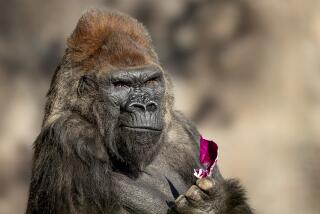San Diego Zoo’s Beloved Escape-Artist Ape Dies
- Share via
SAN DIEGO — With the solemnity usually reserved for the passing of revered civic leaders, San Diego Zoo officials on Friday announced the death of Ken Allen, an escape-artist orangutan so beloved that he had his own fan club.
Zoo officials had worried that the death of the 29-year-old Bornean orangutan after a fight with cancer would be traumatic for local zoo lovers, particularly the Orang Gang, a group that appears daily to check on Ken Allen and the zoo’s other seven orangutans.
“The San Diego Zoo’s animal care staff made the difficult decision to ease Kenny’s suffering,” zoo Executive Director Douglas Myers told a hushed news conference. “He was dearly loved and he will be sorely missed.”
Ken Allen was euthanized at 11:05 a.m., Myers said.
In the days leading up to his death, Orang Gang members held a vigil outside Ken Allen’s enclosure.
“He’d have done the same for us,” said Orang Gang member Marlene MacLeay, 61, a retired postal employee from Van Nuys. “Everybody is just devastated.”
Even in a city known for its affection for zoo animals, Ken Allen won a special place in the civic heart.
In the early 1980s he won national fame for his crafty escapes and his ability to outwit his keepers. A headline writer called him “Hairy Houdini.”
Ken Allen sweatshirts became top sellers. A psychiatrist suggested that Ken Allen represented the universal urge for freedom and wrote the “Ballad of Ken Allen.”
A San Diego newspaper did a “newsmaker profile” on Ken Allen, the first nonhuman ever profiled in the paper. Children in Fullerton started a “Free Ken Allen” campaign.
At one point, Ken Allen and his mate, Vickie, teamed up for a dual escape, with the male instructing the female on the use of a branch as a crowbar, according to witnesses.
Finally, after the zoo made $45,000 in improvements to the orangutan enclosure, Ken Allen stopped going AWOL. In recent years he was mateless, and his main diversions were visits from Orang Gang regulars and others.
“Kenny and I have been buddies since I retired,” said B.J. McDuffee, 75, a former state clerical worker. “He would greet me when I came to visit. If I missed a day, he’d be angry at me next time and just turn his back on me.”
The 240-pound red-haired beast, a member of an endangered species, was not always quick with his affections. It took nearly six years for him to warm to Twyla Baker, 42, editor of the Orang Gang News, which plans a special two-page edition about Ken Allen’s death.
“People will take this very hard,” Baker said.
Born at the zoo, Ken Allen got his name from two zoo workers--Ken Willingham and Ben Allen--who rescued him from a neglectful mother who appeared to be on the verge of smothering him. He became comfortable with humans.
Last month Ken Allen changed his eating habits, always a troubling sign in zoo animals, choosing carrots and yams over his favorite, fruit. He became listless and began coughing.
A biopsy and a CAT scan at Mercy Hospital in San Diego confirmed that Ken Allen had b-cell lymphoma, a fast-spreading cancer that is rare in orangutans. Zoo officials immediately notified Orang Gang members of the bad news.
Although the zoo has used chemotherapy and radiation on other cancer-stricken animals, curators concluded that Ken Allen’s chances for recovery were slim.
More to Read
Sign up for Essential California
The most important California stories and recommendations in your inbox every morning.
You may occasionally receive promotional content from the Los Angeles Times.












